The dachshund dog, affectionately known as the "wiener dog," is a charming and distinctive breed that has captured hearts worldwide with its unique appearance and spirited personality. These small but mighty dogs pack a lot of character into their long, low-riding frames, making them one of the most recognizable and beloved dog breeds.
Whether you're considering adding a dachshund to your family or simply want to learn more about these fascinating dogs, this comprehensive guide will explore their personality traits, care requirements, and what makes them such special companions.
Personality and Temperament Traits
Dachshund dogs are known for their bold and confident personalities, which often seem too big for their small stature. These intelligent hounds are incredibly loyal to their families, forming deep emotional bonds that last a lifetime. Their affectionate nature makes them excellent companions, always eager to cuddle and spend time with their loved ones.
Despite their small size, dachshunds maintain the hunting instincts of their hound heritage. They're alert, curious, and surprisingly brave, making them exceptional watchdogs. However, this protective nature can sometimes manifest as excessive barking, particularly when they encounter new people or situations.
Training and Intelligence Considerations
While dachshund dogs are undeniably intelligent, their independent nature can make training a unique challenge. These clever canines have a stubborn streak that requires patience and consistency from their owners. Positive reinforcement techniques, especially those involving treats, tend to be most effective in motivating these food-driven pups.
Early socialization is crucial for developing a well-rounded dachshund. Exposure to different people, pets, and environments during their formative weeks helps prevent anxiety and aggressive tendencies later in life.
Exercise and Activity Requirements
Despite their short legs, dachshund dogs need regular exercise to maintain good health and prevent weight gain. Daily walks, playtime, and mental stimulation are essential for keeping these energetic dogs happy and well-behaved. However, it's important to monitor their activity level to prevent strain on their long backs.
Interactive toys and games that challenge their hunting instincts can provide excellent mental and physical exercise. Just be mindful of activities that involve jumping or climbing stairs, as these can put unnecessary stress on their unique body structure.
Living with a Dachshund
Dachshund dogs adapt well to various living situations, from spacious homes to apartments, as long as their exercise needs are met. Their moderate size makes them convenient for city living, though neighbors should be prepared for their vocal nature.
These dogs thrive on attention and don't do well when left alone for extended periods. They're best suited to families who can provide plenty of interaction and include them in daily activities.
Frequently Asked Questions
How can I effectively train my stubborn Dachshund to obey commands?
Use positive reinforcement with high-value treats, keep training sessions short and fun, and remain consistent with commands. Start training early and focus on one command at a time. Never use harsh corrections, as this can make them more stubborn.
What are the best socialization practices to help my Dachshund get along with other dogs and strangers?
Begin socialization as early as possible, exposing your dachshund to various people, dogs, and environments in a controlled, positive manner. Use treats and praise to reward calm, friendly behavior, and gradually increase exposure to new situations.
How much exercise does a Dachshund need to stay healthy and happy?
Dachshunds need about 30-60 minutes of exercise daily, split into shorter sessions. This should include walks, playtime, and mental stimulation activities. Avoid high-impact activities that could strain their backs.
Why does my Dachshund bark so much, and how can I manage their loud barking?
Dachshunds bark to alert, express excitement, or demand attention. Manage excessive barking through consistent training, providing adequate exercise, and teaching the "quiet" command. Consider using positive reinforcement to reward quiet behavior.
Are Dachshunds good family pets for homes with children and other small animals?
Dachshunds can be excellent family pets when properly socialized. They should be supervised with young children who may not understand how to handle them gently. Due to their hunting instincts, careful introduction to smaller pets is necessary, and some may never be trustworthy around small animals.






